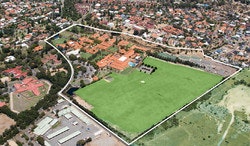Year 11 Mathematics Foundation
This course is designed for students who have not demonstrated the required numeracy skills, through the OLNA test to qualify for Mathematics Essentials.
Mathematics Foundation is a General course which focuses on building the capacity, confidence and disposition to use mathematics to meet the numeracy standard for the WACE. It provides students with the knowledge, skills and understanding to solve problems across a range of contexts, including personal, community and workplace/employment. This course provides the opportunity for students to prepare for post-school options of employment and further training.
Unit 1
This unit provides students with the mathematical knowledge, understanding and skills to solve problems relating to addition and subtraction, length, mass, capacity and time, and involving the extraction of information from, and the interpretation of, various simple forms of data representation used in everyday contexts. Teachers are encouraged to apply the content of this unit in contexts which are meaningful and of interest to their students. The number formats for the unit are whole numbers and money.
This unit includes five content areas.
1.1: Whole numbers and money
1.2: Addition and subtraction with whole numbers and money
1.3: Length, mass and capacity
1.4: Time
1.5: Data, graphs and tables
Unit 2
This unit provides students with the mathematical knowledge, understanding and skills relating to fractions and decimals, solving problems relating to multiplication and division, perimeter, area and volume and qualitative probability from everyday contexts. Teachers are encouraged to apply the content of this unit in contexts which are meaningful and of interest to their students. The number formats for this unit are whole numbers, money, fractions and decimals.
This unit includes five content areas.
2.1: Understanding fractions and decimals
2.2: Multiplication and division with whole numbers and money
2.3: Metric relationships
2.4: Perimeter, area and volume
2.5: The probability of everyday events
ASSESSMENTS
Assessment will include practical applications: 50% | tests 50%.
REPORTING
A brief interim report on class work and behaviour will be issued towards the end of Term 1. The achievement for the course will be reported as a College A - E grade as well as a percentage mark for the course and an examination mark for both Semester 1 and the year. In addition, the student's approach to class work and behaviour will be reported via the usual key performance indicators.
STUDENT EXPECTATIONS
Students are expected to:
- bring the required text, calculator and stationery to each lesson
- complete regular homework from a variety of sources including the text, worksheets and Mathletics
- be aware of and adhere to assessment dates and project deadlines
- be proactive in seeking help from the teacher when required.
